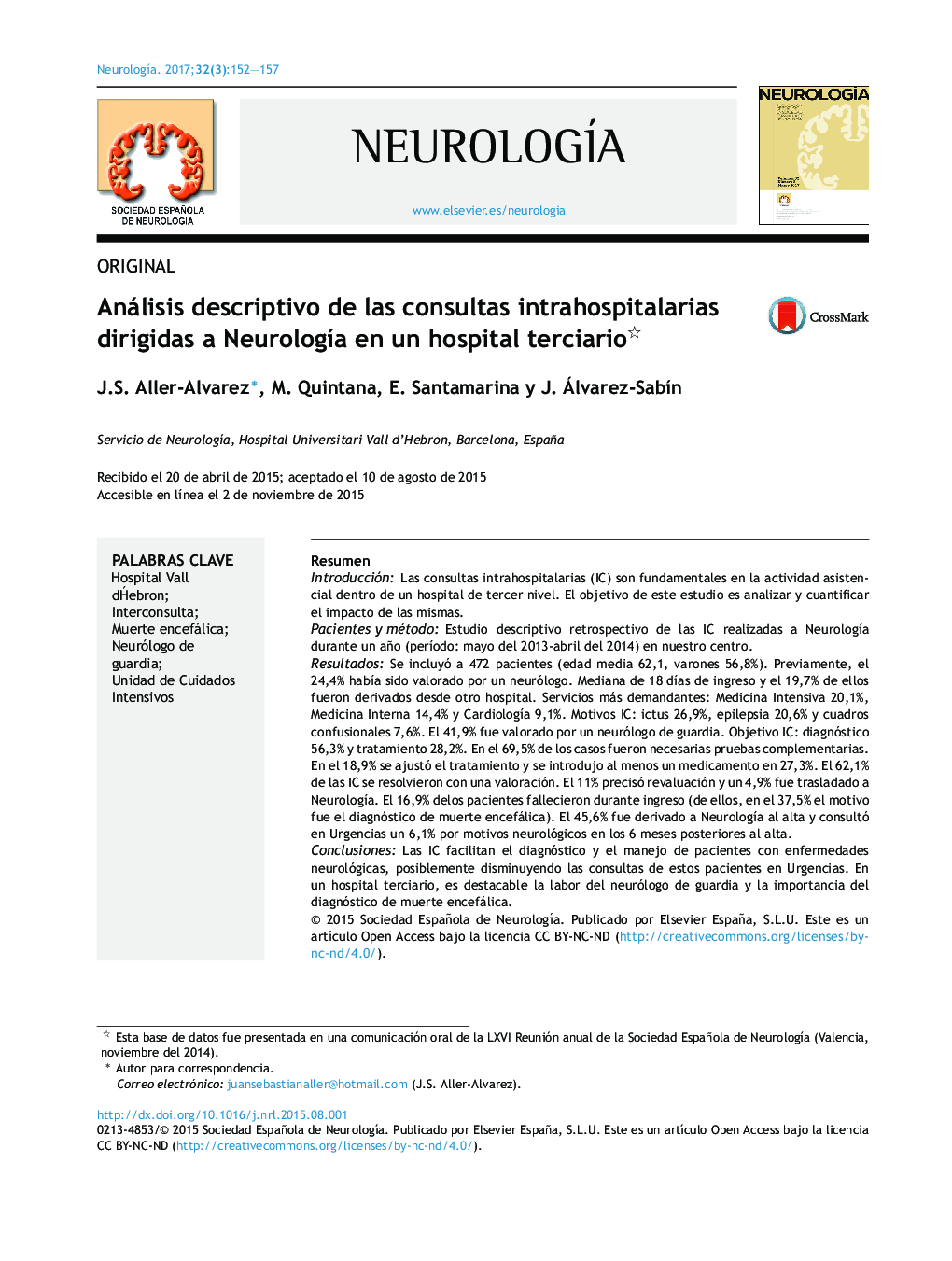| Article ID | Journal | Published Year | Pages | File Type |
|---|---|---|---|---|
| 5631818 | Neurología | 2017 | 6 Pages |
ResumenIntroducciónLas consultas intrahospitalarias (IC) son fundamentales en la actividad asistencial dentro de un hospital de tercer nivel. El objetivo de este estudio es analizar y cuantificar el impacto de las mismas.Pacientes y métodoEstudio descriptivo retrospectivo de las IC realizadas a NeurologÃa durante un año (perÃodo: mayo del 2013-abril del 2014) en nuestro centro.ResultadosSe incluyó a 472 pacientes (edad media 62,1, varones 56,8%). Previamente, el 24,4% habÃa sido valorado por un neurólogo. Mediana de 18 dÃas de ingreso y el 19,7% de ellos fueron derivados desde otro hospital. Servicios más demandantes: Medicina Intensiva 20,1%, Medicina Interna 14,4% y CardiologÃa 9,1%. Motivos IC: ictus 26,9%, epilepsia 20,6% y cuadros confusionales 7,6%. El 41,9% fue valorado por un neurólogo de guardia. Objetivo IC: diagnóstico 56,3% y tratamiento 28,2%. En el 69,5% de los casos fueron necesarias pruebas complementarias. En el 18,9% se ajustó el tratamiento y se introdujo al menos un medicamento en 27,3%. El 62,1% de las IC se resolvieron con una valoración. El 11% precisó revaluación y un 4,9% fue trasladado a NeurologÃa. El 16,9% delos pacientes fallecieron durante ingreso (de ellos, en el 37,5% el motivo fue el diagnóstico de muerte encefálica). El 45,6% fue derivado a NeurologÃa al alta y consultó en Urgencias un 6,1% por motivos neurológicos en los 6 meses posteriores al alta.ConclusionesLas IC facilitan el diagnóstico y el manejo de pacientes con enfermedades neurológicas, posiblemente disminuyendo las consultas de estos pacientes en Urgencias. En un hospital terciario, es destacable la labor del neurólogo de guardia y la importancia del diagnóstico de muerte encefálica.
IntroductionIn-hospital consultations (IHC) are essential in clinical practice in tertiary hospitals. The aim of this study is to analyse the impact of neurological IHCs.Patients and methodOne-year retrospective descriptive study of neurological IHCs conducted from May 2013 to April 2014 at our tertiary hospital.ResultsA total of 472 patients were included (mean age, 62.1 years; male patients, 56.8%) and 24.4% had previously been evaluated by a neurologist. Patients were hospitalised a median of 18 days and 19.7% had been referred by another hospital. The departments requesting the most in-hospital consultations were intensive care (20.1%), internal medicine (14.4%), and cardiology (9.1%). Reasons for requesting an IHC were stroke (26.9%), epilepsy (20.6%), and confusional states (7.6%). An on-call neurologist evaluated 41.9% of the patients. The purpose of the IHC was to provide a diagnosis in 56.3% and treatment in 28.2% of the cases; 69.5% of the patients required additional tests. Treatment was adjusted in 18.9% of patients and additional drugs were administered to 27.3%. While 62.1% of cases required no additional IHCs, 11% required further assessment, and 4.9% were transferred to the neurology department. Of the patient total, 16.9% died during hospitalisation (in 37.5%, the purpose of the consultation was to certify brain death); 45.6% were referred to the neurology department at discharge and 6.1% visited the emergency department due to neurological impairment within 6 months of discharge.ConclusionsIHCs facilitate diagnosis and management of patients with neurological diseases, which may help reduce the number of visits to the emergency department. On-call neurologists are essential in tertiary hospitals, and they are frequently asked to diagnose brain death.
